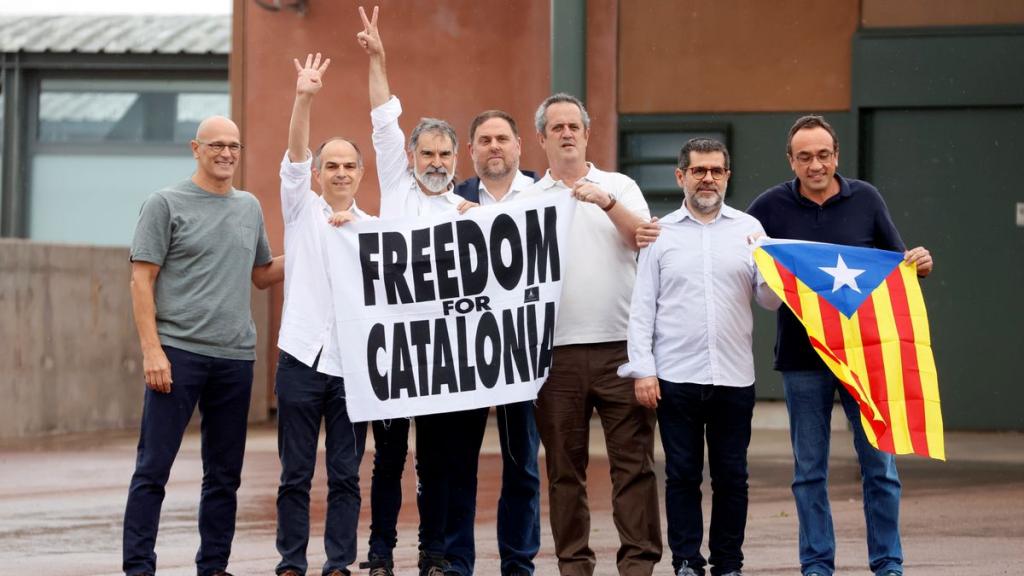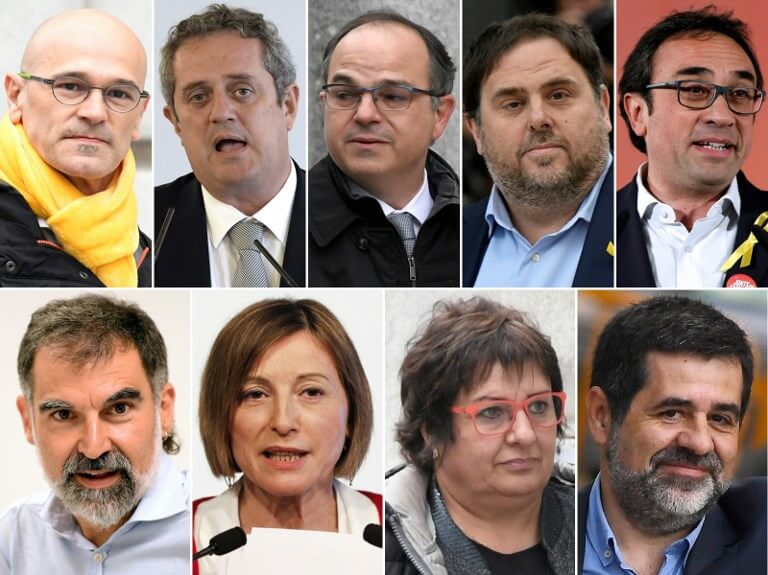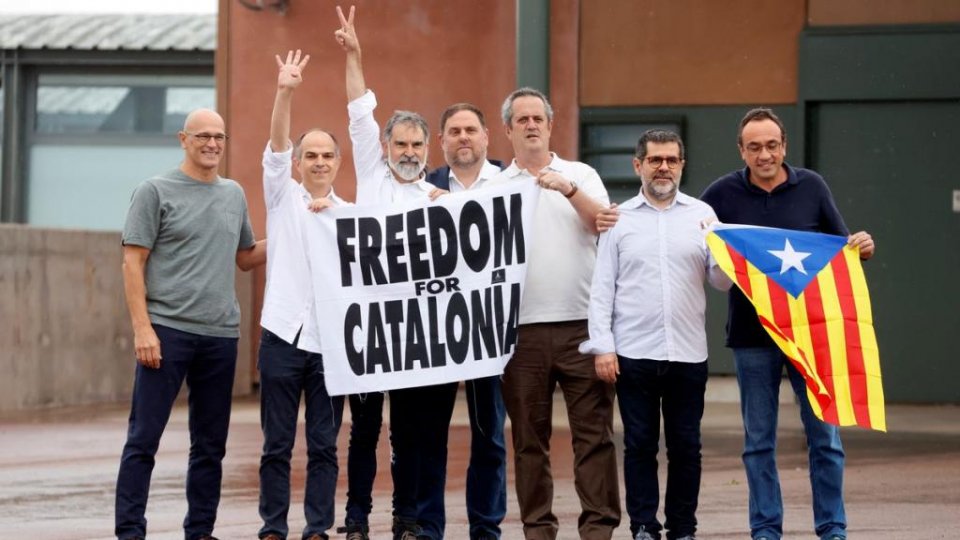The nine Catalan leaders and activists, jailed for their roles in the October 2017 independence referendum, walked free from prison on Wednesday, following the pardons granted at a Spanish government cabinet meeting on Tuesday.
Spain’s official gazette published earlier in the day on Wednesday the government decree pardoning them.
The nine leaders had been jailed for between 9-13 years by the Supreme Court on 14 October 2019. They had been convicted for crimes of sedition and misuse of funds with the verdicts causing widespread protests across Catalonia. The nine men and women have spent between three-and-a-half and four years behind bars, including pre-trial detention.

The nine are [also see below details of original sentencing]: Oriol Junqueras – former Catalan vice president, finance minister and leader of the Esquerra Republicana (ERC) party; Jordi Turull – former Catalan presidency minister; Joaquim Forn – former Catalan interior minister; Raül Romeva – former Catalan foreign action minister; Dolors Bassa – former Catalan labour and social affairs minister; Josep Rull – former Catalan territory minister; Carme Forcadell – former Catalan Parliament speaker; Jordi Sànchez – former Catalan National Assembly (ANC) grassroots leader (now Secretary General of the Junts per Catalunya party), and Jordi Cuixart – Òmnium Cultural grassroots leader.
During a session in the Spanish Congress on Wednesday, Pablo Casado, leader of the main right-wing opposition People’s Party (PP), called for the resignation of socialist Prime Minister Pedro Sánchez for issuing the pardons without consulting MPs. [See below for full background to pardons and political opposition to granting them].
Reactions leaving jail
One of the first to leave jail on Wednesday, Carme Forcadell, said that she defended ‘amnesty, self-determination and the Catalan Republic’. She said ‘it is not a great victory, but it is a victory’. She added: ‘Today is a day of joy, but joy is not complete because what we want is the end of repression’. Dolors Bassa said ‘it is true that the repression is not yet over, but this is a first step.’
‘We won’t be silenced by these pardons,’ said Jordi Sànchez, leaving prison. ‘For all the people who believe Catalonia will achieve freedom, we’ll do it,’ he added.
‘The only reason why we political prisoners are free is because Spain couldn’t keep us any longer in prison — and they couldn’t due to pressure from Europe, and also pressure from Catalans,’ said Jordi Cuixart. ‘We’ll continue to work for justice and an amnesty for our country,’ said Joaquim Forn. ‘Our freedom won’t be complete until those in exile can return to Catalonia,’ said Jordi Turull.
Granting of pardons
On Monday, Spanish Prime Minister Pedro Sánchez had announced at Barcelona’s Liceu Opera House that his cabinet would be granting pardons to the jailed leaders on Tuesday, stating that the measure would encourage ‘reconciliation’ between Catalonia and Spain and as a first step towards leaving behind ‘confrontation’. His lecture at the opera house was entitled ‘Reencuentro’, meaning ‘reunion’ (or also ‘reunited’), and ‘a project for the future for all of Spain’.
The decree for pardons has cancelled the remainder of prison terms ranging from 9-13 years linked to the 2017 banned referendum and a short-lived independence declaration. But the leaders will still not be able to hold public office until the end of their sentences, and they could also go back to prison if they go against Spanish law again, the decree stated.
Despite polls showing that much of Spain’s public is against the pardons, Sánchez has defended them, arguing that they are popular in Catalonia and that freeing the leaders will be a new start for relations between central and regional authorities.
Sánchez had said on Monday that the pardons law, introduced in 1870, existed ‘in order to resolve conflicts and open paths for understanding, so that a life in common is possible’.
The legislation provides the Spanish government the exclusive powers to pardon any person convicted with a final sentence, and Sánchez recalled the legal base for his decision, including the 1870 law and Article 62 of the Constitution. He called upon Spain’s opposition parties to not question the legality of the pardons, implicitly referring to the right-wing groups, who are staunchly against them.

During a session in the Spanish Congress on Wednesday, however, Pablo Casado, leader of the main right-wing opposition People’s Party (PP), called for the socialist prime minister’s resignation for issuing the pardons without consulting MPs.
‘You are applauding an unfortunate day for Spain’s democratic history, you are throwing the fate of the country into the hands of the separatists,’ Casado said, accusing Sánchez of lying because he had vowed not to make concessions to the pro-independence groups when he came to power.
Ever since Sánchez came to power in Madrid with the support of pro-independence parties, and re-elected thanks to an abstention from Catalonia’s Esquerra Republicana (ERC) party, the right-wing opposition groups have accused his cabinet of ‘secret dealings’, and offering pardons as a possible thanks for helping to appoint him as prime minister. Sánchez has always denied the accusations, stating that his government would make the same decision even if they had an absolute majority of 300 MPs.
Sánchez responded on Wednesday in the Spanish Congress by saying that the decision to issue pardons was ‘brave, restorative and in favour of coexistence’.
On Tuesday, following the cabinet meeting to grant the pardons, Sánchez had given a statement outside the Moncloa residence. ‘I’m speaking to the Spanish public to report that the Cabinet has today agreed to grant the pardons to the prisoners of the procés [the Catalan independence movement] who are still in prison,’ he said. ‘As you know, the judicial route concluded with a final sentence from the Supreme Court, which the government is not placing in question. Then, a series of people and civil institutions formulated a petition for a pardon that the government had to consider.’
He said that the pardons did not require that those who had been convicted to ‘change their ideas’. ‘They were not punished for their ideas,’ he said, ‘but rather for their acts against democratic legality. We live together and together we must deal with the same concerns and the same problems. We will find difficulties along the way, but I believe that this is well worth trying.’
Sánchez reiterated that the aim of the government’s decision is to open a new period of dialogue and to build bridges between people who are very distant politically, but who cannot ignore each other because, he stressed, ‘Spain without Catalonia would simply not be Spain, just as Catalonia without the rest of Spain would not be Catalonia’.
On Sunday 13 June, over 25,000 protestors gathered in the Plaza de Colón in Madrid to rally against the proposed pardons. The leaders of the right-wing People’s Party (PP), Ciudadanos (Cs) and far-right Vox all attended the rally.
ALSO READ: Council of Europe calls on Spain to release jailed Catalan leaders and drop extradition proceedings

The nine jailed politicians and activists:
- Oriol Junqueras – former Catalan vice president, finance minister and leader of the Esquerra Republicana (ERC) party. Junqueras spent 711 days in preventive detention prior to sentencing. Crime: sedition and misuse of public funds. Prison sentence was: 13 years. Disqualification: 13 years.
- Jordi Turull – former Catalan presidency minister. Turull spent 602 days in preventive detention prior to sentencing. Crime: sedition and misuse of public funds. Prison sentence was: 12 years. Disqualification: 12 years
- Joaquim Forn – former Catalan interior minister. Forn spent 711 days in preventive detention prior to sentencing. Crime:sedition. Prison sentence was: 10.5 years. Disqualification: 10.5 years.
- Raül Romeva – former Catalan foreign action minister. Romeva spent 602 days in preventive detention prior to sentencing. Crime: sedition and misuse of public funds. Prison sentence was: 12 years. Disqualification: 12 years.
- Dolors Bassa – former Catalan labour and social affairs minister. Bassa spent 602 days in preventive detention prior to sentencing. Crime: sedition and misuse of public funds. Prison sentence was: 12 years. Disqualification: 12 years.
- Josep Rull – former Catalan territory minister. Rull spent 602 days in preventive detention prior to sentencing. Crime:sedition. Prison sentence was: 10.5 years. Disqualification: 10.5 years.
- Carme Forcadell – former Catalan Parliament speaker. Forcadell spent 571 days in preventive detention prior to sentencing. Crime: sedition. Prison sentence was: 11.5 years. Disqualification: 11.5 years.
- Jordi Sànchez – former Catalan National Assembly (ANC) grassroots leader. Sànchez spent 728 days in preventive detention prior to sentencing. Crime: sedition. Prison sentence was: 9 years. Disqualification: 9 years.
- Jordi Cuixart – Òmnium Cultural grassroots leader. Cuixart spent 728 days in preventive detention prior to sentencing. Crime: sedition. Prison sentence was: 9 years. Disqualification: 9 years
Click here for all our reports related to Catalan independence, as well as the Catalan trial, verdicts and sentencing.
Sign up for the FREE Weekly Newsletter from Spain in English.
Please support Spain in English with a donation.
Click here to get your business activity or services listed on our DIRECTORY.
Click here for further details on how to ADVERTISE with us.



